Clive Palmer’s legal battles likened by Supreme Court judge to ‘enthusiastic game of Uno’
Queensland mining magnate Clive Palmer has lost his attempt to have criminal charges against him dismissed, with the judge overseeing the case likening the bid to “an enthusiastic game of Uno”.
Police & Courts
Don't miss out on the headlines from Police & Courts. Followed categories will be added to My News.
Mining magnate Clive Palmer’s failed attempt to have criminal charges against him dismissed have been likened to him playing “an enthusiastic game of Uno” by a judge overseeing the case.
Justice Peter Callaghan has ordered a permanent stay of proceedings filed in the Supreme Court by Mr Palmer who was seeking to have charges currently before the Magistrates Court of Queensland thrown out.
The charges had stalled in the lower court pending the outcome of the Supreme Court stay applications but the drawn-out case will now be able to proceed in the lower court after years of delay.
In a judgment handed down on Wednesday, Justice Callaghan described the web of legal proceedings lodged by Mr Palmer and his companies as a calculated attempt to “fragment and or dislocate the processes of the courts”.
“Further applications have slapped onto the Registry counter like cards in an enthusiastic game of Uno,” he wrote of the legal battle.
In early 2020, Mr Palmer and his company Palmer Leisure Coolum were charged in relation to an alleged takeover bid of The Presidents Club with an offer to purchase shares and occupancy rights for villas at the embattled Coolum resort.

ASIC alleged that in June 2012 after publicly proposing to make a takeover bid for securities, Palmer Leisure Coolum (PLC) did not make the offer within the prescribed time frame.
As an individual Mr Palmer himself was charged with aiding, abetting, counselling or procuring PLC, of which he was a director, to commit the alleged offence.
The corporate watchdog also slapped him with further charges including two counts of fraud and two counts of dishonest use of position as a company director.
ASIC alleged that in 2013, Mr Palmer dishonestly obtained an advantage for the Palmer United Party and or Cosmo Developments, a company he controlled, by authorising a $10 million transfer.
He was also charged with fraud offences relating to the alleged transfer of $2.1 million to dishonestly obtain an advantage for his political party and or the advertising agency Media Circus Network.
Mr Palmer has already won a separate civil case in the higher court relating to those alleged transactions, however the criminal charges in the Magistrates Court are continuing.
Mr Palmer’s Supreme Court action argued the charges brought against him and his companies by ASIC was an abuse of process.
But Justice Callaghan found the legal action bought by Mr Palmer and his companies were actions calculated to fragment and or dislocate the processes of the courts.
“The “processes” in question are those by which a criminal charge is laid by the state against an individual person or corporation,” he said.
“They may appear cumbersome, and their machinations are certain to cause frustration for any individual who feels that they have been accused wrongly. Such individual no doubt believes that their own case is “exceptional” and might be adamant that the “process” is an “abuse”.”
He said despite that, the same procedures applied to every individual and there must be something “exceptional” about a case to warrant its removal from the mainstream processes, which he found were not present in this case.
Justice Callaghan said using the Supreme Court proceedings to agitate Mr Palmer’s concerns was “wrong and improper”.
“It is right and proper that they should be ventilated in the lower courts,” he said.
“All of the plaintiffs’ grievances can and should be dealt with in the lower courts.”
In relation to the takeover bid charges, Mr Palmer and his companies had made allegations including that the Commonwealth Director of Public Prosecutions (CDPP) had breached its duties and that ASIC had failed to carry out a proper investigation.
Mr Palmer also claimed he and his companies had been “singled out for special treatment” and that “an inference of impropriety should be drawn from the alleged close working relationship between ASIC investigators and CDPP prosecutors.”
In relation to the fraud charges, Mr Palmer argued there was an absence of good faith in the prosecution and that there was wrongful conduct by ASIC.
His lawyers argued the prosecution raised questions about the appropriateness of pursuing such charges, the feasibility of doing so when no one had suffered financial detriment, and the implications for commercial activity if prosecutions were pursued in all such cases.
Justice Callaghan said the filings for Mr Palmer impugned the conduct of the Commonwealth defendants which includes the CDPP and ASIC.
“In effect, bad faith has been alleged on bases that, if established, would make legal history,” he said.
Justice Callaghan said he had not dismissed the complaints as he had been urged to but also noted the claims were unsubstantiated.
“Courts would fail their constitutional responsibility if they assumed infallibility on the part of the executive,” he said.
“Even in Australia, responsible agencies have been known to betray a fundamental misunderstanding of criminal cases they were pursuing, and maintain (even on appeal) arguments in favour of convictions that were always unattainable and eventually exposed as unsustainable.
“The loose collection of circumstances identified, and questions asked by the plaintiffs might fuel speculation, but afford no inference.”
Justice Callaghan dismissed Mr Palmer’s applications for summary judgment and permanently stayed the proceedings.
“The stay of the proceedings is granted on the basis that there is another jurisdiction in which these matters can and should be dealt with,” he said.
The plaintiffs, Mr Palmer and his company Palmer Leisure Coolum, were ordered to pay costs on an indemnity basis.
The charges are due to be mentioned in the Brisbane Magistrates Court again on December 2.



